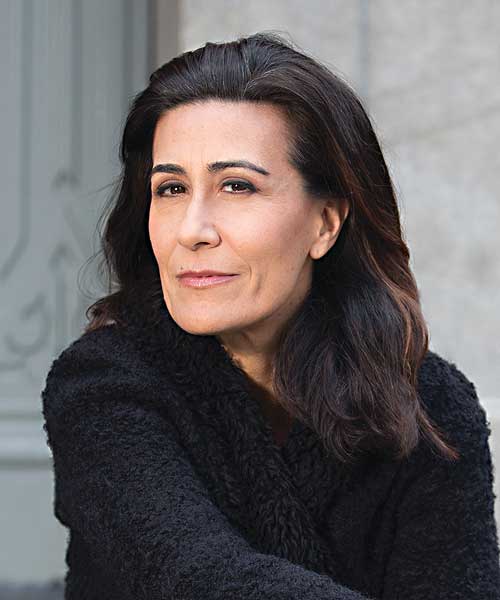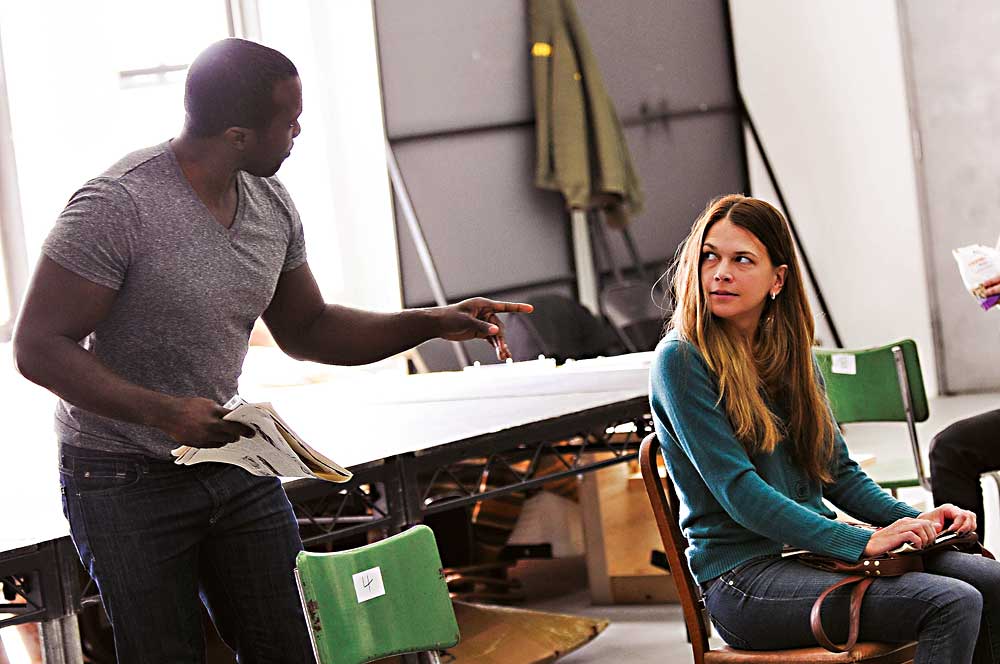 Jeanine Tesori has a habit of making her musical heroines revisit their pasts.
Jeanine Tesori has a habit of making her musical heroines revisit their pasts.
Take Shrek the Musical, for example. Princess Fiona reflects on her long life trapped in a tower, while a pre-teen and teenage Fiona create a trio in “I Know It’s Today.” Then there’s Fun Home, in which Tesori composes melodies for writer and graphic artist Alison Bechdel at different stages of life—child, college student, middle age—that merge into one number, which the three perform together in the finale. And, in Violet, the title character goes on a journey of self-discovery, reflecting on a horrific accident that scarred her when she was younger, and—you guessed it—the young and older Violet sing about it together.
Now Tesori is in a duet with her younger self, in a sense, as she revisits Violet, her first musical, which premiered at Playwrights Horizons in 1997, and is just now making its Broadway debut at Roundabout Theatre Company in New York City.
“How meta,” Tesori says, with a shrug. But she does concede that she and bookwriter/lyricist Brian Crawley are looking at Violet as if it were a brand-new musical. “We have to not step on the impulse of our younger selves, because what I think makes the piece special is its naïveté, in some ways,” she says. It’s a quality she tries to maintain in all her work: “I feel like you have to keep your younger self alive to really write or perform fully, because it gives you a sense of play.”
Indeed, if you ask Tesori, her composer self is still an adolescent, though if you look at her sophisticated body of work, that’s the last description that comes to mind. With four Tony nominations, hit musicals including Thoroughly Modern Millie and Caroline, or Change, a few operas, some film scores, and many credits for incidental music in plays, including her celebrated collaboration with Nicholas Hytner of London’s National Theatre for his production of Twelfth Night, Tesori rose to prominence quickly. This season, however, to continue with the maturation metaphor, her career has truly come of age.
Rumors of a commercial run are still circulating for Fun Home, with book and lyrics by playwright Lisa Kron adapted from Bechdel’s graphic memoir of the same title, which became an unexpected smash hit last October when it premiered at New York’s Public Theater to rave reviews. Next came the announcement that Violet would finally be making it to Broadway, 17 years after its Off-Broadway run. Last summer, the show had a one-night concert reading as part of the first season of New York City Center Encores! Off Center, of which Tesori is the artistic director, with Sutton Foster in the lead role. Foster reprises the part in the Roundabout run.

“She’s getting better and better and better,” says Foster, who marks her third collaboration with Tesori, after Millie and Shrek, with Violet. “I’m so proud of her—proud of the work she keeps putting out there and of the risks she keeps taking. She’s one of our great American composers right now.”
On a windy day in March, Tesori sips a coffee at a brick-walled café near her midtown studio. It’s her first day off from Violet rehearsals, and though she’s dressed for comfort, she possesses a stoic, almost regal quality. Her hair is sleekly pulled back, revealing the dynamism in her face, and although she’s undeniably self-assured, she speaks sincerely and vulnerably about the unexpected journey she’s on with Violet—a journey that almost did not happen.
Tesori says she didn’t want to bring Violet back for Off Center because the idea of doing one of her own shows in the revival series felt “yucky” and “ego-driven.” When she took over the Encores! program, she booked Foster a year in advance (“She’s just one of those people in my life,” Foster says, “who when she calls, I’m like, What is it? I’ll be there”), but without a musical in place. When Tesori had trouble securing the rights to a last piece in the three-show summer season, she was encouraged to take another look at her own canon. Thus Violet was reborn.
Based on The Ugliest Pilgrim by Doris Betts, Violet is about a young girl who is accidentally hit in the face with an ax by her father; when she grows up, she embarks on a solo cross-country trip in search of healing. It’s the only musical for which Tesori chose the source material herself—every other project has been brought to her by a co-writer—and the show marked the beginning of her composing career. Tesori had been working as a music director, conductor and arranger for Broadway shows, including The Who’s Tommy and the 1995 revival of How to Succeed in Business Without Really Trying, but the gigs became “very trying mentally” and she began hitting a wall in her late 20s.
“I had a great mentor [Buryl Red] who said, ‘Just go do it. A lot of people talk about it, but why don’t you just stop talking about it and go actually do it?’” She took that advice to the extreme: She rented a lighthouse in upstate New York and spent about a year just writing the show, collaborating long-distance with Crawley, who she met as part of the BMI Lehman Engel Musical Theatre Workshop. After this self-induced Walden-like idyll, the show went to the O’Neill Center’s National Music Theater Conference and then on to Playwrights Horizons, where it had a highly successful run and won the Lucille Lortel and Drama Critics’ Circle Awards for best musical, as well as an Obie for Tesori.
When buzz about a potential Broadway transfer arose, Tesori and Crawley bought it “hook, line and sinker,” she recalls, which led to disillusionment and a harsh lesson about the theatre business. “When it didn’t happen, I was pregnant and I went to bed for three days and I did not get out,” Tesori confesses. “As embarrassing as that is—and I’ve never really said that—I was so devastated. You just don’t know what a show is going to do.”

